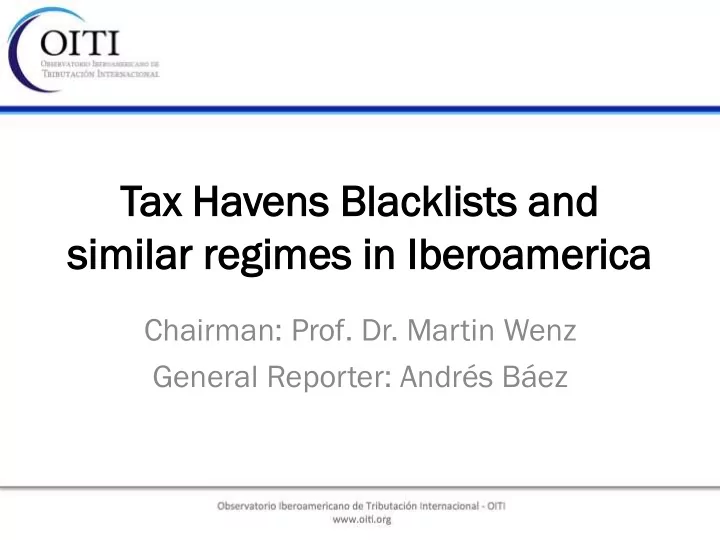

Tax Havens ns Blacklists klists and similar lar regimes es in Iberoameric oamerica Chairman: Prof. Dr. Martin Wenz General Reporter: Andrés Báez
Blacklisting • Aim – Protection of national tax base and tax revenue against Distortions by Tax Havens and Harmful Preferential Regimes – (Re-)Allocation of Taxing Rights: BEPS incl. Base Eroding Payments • Conside ideratio ations – Global Tax Landscape • Global Tax Standards: OECD/G20/G7 – EU | World Tax Order – Global Level Playing Field of Taxation • Economic Perspective | Public Policy Perspective | Business Perspective – Impact on Tax Systems, Revenue, International Tax Law and on International Tax Planning – Impact on Negotiations of DTC, no beggar-thy-neighbour policy – Impact on other regulatory aspects (USD- Clearing/AML/…)
Questionnaire. • IDENTIFICATION. – Object: Countries/Regimes. – Reasons for inclusion. – Incorporations and exits. – Un Undue mainten enan ance/non incor orpor oratio ations. – Influence of OECD/EU materials • DEFENSIVE MEASURES. • INTERMEDIATE REGIMES.
IDENTIFICATION (Object) • Countries/Territories (TH) – Argentina, Brasil, Colombia, Ecuador, Mexico, Peru, Spain, • Tax regimes (PTR) – Argentina?, Brasil, Colombia, Ecuador
IDENTIFICATION (Reasons for inclusion) • Argentina (White list based upon Abstract criteria + Abstract criterion). • Brasil (blacklist based upon Abstract criteria). • Colombia (blacklist based upon Abstract criteria). • Ecuador (blacklist based upon unknown criteria). • Peru (blacklist + Abstract criteria). • Spain (blacklist based upon Abstract criteria).
IDENTIFICATION (Reasons for inclusion) • Abstract criteria. – Certainty regarding (relative) importance of the criteria • Yes: Argentina (two alternative criteria), Brazil (one criterion for TH two for PTR) one Colombia (one criterion for TH two for PTR), Peru (low taxation + one out of 4 criteria) • No: Ecuador, Spain. – CRITERIA: Argentina ina (TIEA or DTC for White list or low tax rate) Brazil (low tax rate [20%] or lack of information regarding shareholders or beneficial owners; more for PTR), Colombia (low tax rate, or lack of Exchange of information or lack of transparency, or lack of substance requirement or internationally accepted criteria), Peru (taxation lower than 50% of the corresponding Peruvian taxation + lack of information or tax benefits exclusive for residents or ring fencing or self promotionas TH) Spain (existence of DTC, TIEA or CMATM amended by Protocol in 2010 and/or? Effective exchange of information and/or Peer Reviews by the Global Forum)
Special Tax Regime • Extended residence for nationals or limits to change of residence (Brazil, Colombia, Spain). • Taxation of items of income otherwise exempted for non- residents (some capital gains in Brazil) • Limitations of deductibility (or non-deductibility) of payments (Brazil, Peru, Spain) • Increased WTHs (Brazil, Colombia) • Transfer pricing rules for transactions with independent parties (Brazil, Colombia, Peru, Spain) • Indication for the application of GAARs (Colombia). • Easier application of CFC rules (Colombia) • Special formal obligations.
Legal Problems (I) • Undue inclusions / exclusions according to the abstract criteria • Unjustified inclusions. – Peruvian list/Ecuatorian list/Spanish list until 2014/Current Spanish list (Liechtenstein or Monaco). • Unproportional tax consequences – Inclusions posibly based merely upon low taxation. • Argentina, Brazil, Colombia.
Legal problems (II) • Discrimination according to Constitutional/EU/EEA Law – Different treatment. – Of comparable situations. – Not justified. – Justified but not proportional
Legal Problems (II) Verti tical al Comparab arabilit ility CO-TH CFC CDC CO-R ParentCo
Legal Problems (II) Horizon izontal tal Compar arab abili ility ty COnoTH CO-TH COnoTH CO-TH Deduction No Deduction Increased Regular WHT WHT
Legal problems (III) • Justification. – Totally unjustified lists?...reconstruction? – Justification on lack of information. • Based on DTCs or TIEAs … what if signatory to the Convention on Mutual Assistance? – Justification on low taxation: prevention of tax avoidance.
Legal problems (IV) • Proportionality. – Can we assumme that a transaction performed by a non resident (resident in a low tax jurisdicton) or by a resident (in a low tax jurisdiction) is per se abusive?
Is this just academic? • “ The European Union embodies ideas protecting the freedom of movement and non-discrimination. Accordingly, taxpayers who live in one country in the European Union and hold accounts in another EU country may challenge anti-tax haven provisions in court on this basis. In addition, taxpayers ma may challe llenge nge anti nti-tax haven en provisions visions on on cons nsti titu tuti tiona nal gro roun unds ds or on the basis of bilateral tax treaties ” . Della Bauserman; Maggie Stehn; Kathy L. Lovett. Report of the Proceedings of the Fifth Assembly of the International Association of Tax Judges (23-24 October 2014). /In/ Bulletin for International Taxation, 2015, p. 423.
Recommend
More recommend